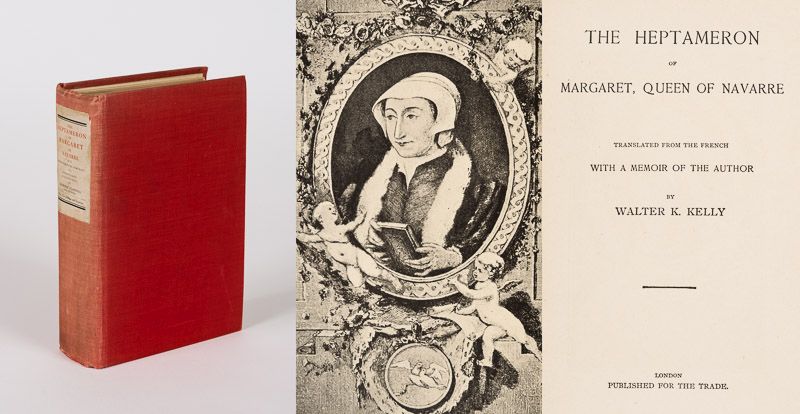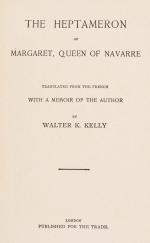Margaret, The Heptameron of Margaret, Queen of Navarre.
The Heptameron of Margaret, Queen of Navarre. Translated from the French with a Memoir of the Author by Walter K. Kelly.
Two Volumes in one (complete set). London, Published for the Trade, no date [c.1918]. Octavo. Frontispiece portrait of Margaret, Volume I – 183 pages / Volume II – 245 pages. Illustrated throughout the two volumes. Original Hardcover. Binding a little shaky. Otherwise in very good condition with only minor signs of external wear.
Marguerite de Navarre (French: Marguerite d’Angoulême, Marguerite d’Alençon; 11 April 1492 – 21 December 1549), also known as Marguerite of Angoulême and Margaret of Navarre, was the princess of France, Queen of Navarre, and Duchess of Alençon and Berry. She was married to Henry II of Navarre. Her brother became King of France, as Francis I, and the two siblings were responsible for the celebrated intellectual and cultural court and salons of their day in France.
Marguerite is the ancestress of the Bourbon kings of France, being the mother of Jeanne d’Albret, whose son, Henry of Navarre, succeeded as Henry IV of France, the first Bourbon king.
As an author and a patron of humanists and reformers, she was an outstanding figure of the French Renaissance. Samuel Putnam called her “The First Modern Woman”.
Following the example set by her mother, Marguerite became the most influential woman in France during her lifetime when her brother acceded to the crown as Francis I in 1515. Her salon, known as the “New Parnassus”, became famous internationally.
Pierre Brantôme said of her: “She was a great princess. But in addition to all that, she was very kind, gentle, gracious, charitable, a great dispenser of alms and friendly to all.″
The Dutch humanist Desiderius Erasmus wrote to her: “For a long time I have cherished all the many excellent gifts that God bestowed upon you; prudence worthy of a philosopher; chastity; moderation; piety; an invincible strength of soul, and a marvelous contempt for all the vanities of this world. Who could keep from admiring, in a great king’s sister, such qualities as these, so rare even among the priests and monks.″
Marguerite wrote many poems and plays. Her most notable works are a classic collection of short stories, the Heptameron, and a remarkably intense religious poem, Miroir de l’âme pécheresse (Mirror of the Sinful Soul). This poem is a first-person, mystical narrative of the soul as a yearning woman calling out to Christ as her father-brother-lover. Her work was passed to the royal court of England, suggesting that Marguerite had influence on the Protestant Reformation in England. (Wikipedia)
- Keywords: Catalogue Three – Literature by Women · French Literature – Rare · Women in History · Women in History – Rare
- Language: English
- Inventory Number: 100161AB
EUR 58,--
© 2026 Inanna Rare Books Ltd. | Powered by HESCOM-Software













